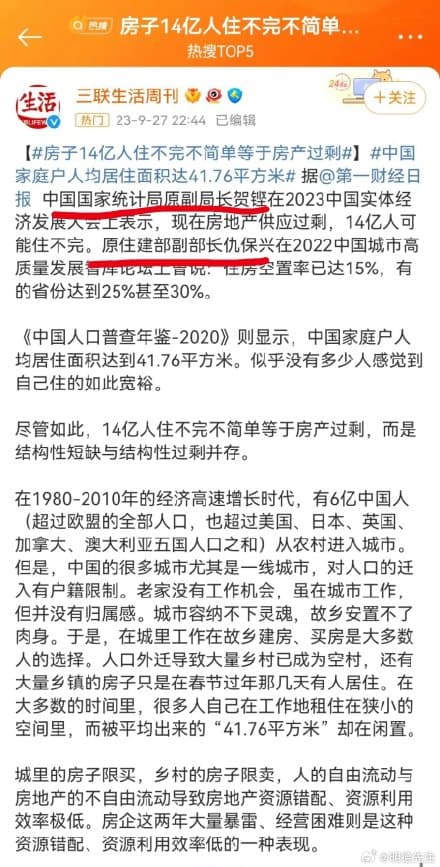China's Housing Market Oversupply and the Plight of Millions Without Homes
In recent weeks, two high-ranking officials from the National Bureau of Statistics of China (NBS) and the Ministry of Housing and Urban-Rural Development (MOHURD), have made shocking revelations about the state of the country's housing market. The former Vice Head of the NBS, Hai Bin, spoke at the 2023 China Real Economy Development Conference and claimed that there is currently an oversupply of real estate in China, with approximately 140 million people potentially lacking adequate housing. Meanwhile, former Vice Minister of MOHURD, Zuo Baoxing, revealed at the 2022 China Forum on High-Quality City Development that the vacancy rate has reached 15%, with some provinces having rates as high as 25% or even 30%.

28 September 2023
The statements made by these officials have sparked intense discussions on Chinese social media platforms, such as Weibo. Netizens have reacted with a mix of frustration, disappointment, and anger towards the government's handling of this issue. Some have also expressed concern about the inflated prices of real estate, which many believe has led to an oversupply of vacant properties that are not affordable for ordinary citizens.
The phrase "空着也不给穷人住" (translating to 'empty can be discounted but cannot' in English) has been widely circulated on Weibo, with many users expressing their frustration at the fact that empty properties are not lowering in price while many people struggle to afford homes. One user exclaimed, "A house is empty and nobody lives there, but it cannot be lowered in price. Young people work hard to buy a house but still can't afford one. They don't want to get married or have children because they can't afford a house, so the population is decreasing."
Another user voiced their concern about the lack of basic living conditions in some communities and shared that many government officials visited households last year, stating that a large number of residents live in poor housing conditions despite owning properties. They expressed disappointment at the fact that these issues were not being addressed and wondered what could be done to prevent people from being cheated during real estate transactions.
The high vacancy rates and oversupply of real estate have also led to concerns about China's future housing policy. While some individuals are believed to own hundreds or even thousands of properties, others struggle to find a place to call home. The situation has sparked discussions about what the future holds for district housing and whether recruiting students will become more challenging due to the high costs of living.
The Chinese government has faced criticism for its lack of action in addressing these issues, particularly regarding housing affordability and accessibility for ordinary citizens. Some have called for reforms in real estate transactions to protect buyers from being cheated and ensure that housing remains a basic human right rather than an unattainable luxury.
As the situation continues to unfold, it remains to be seen how the government will respond to these challenges and address the oversupply of vacant properties while still ensuring that everyone has access to safe, affordable housing.



